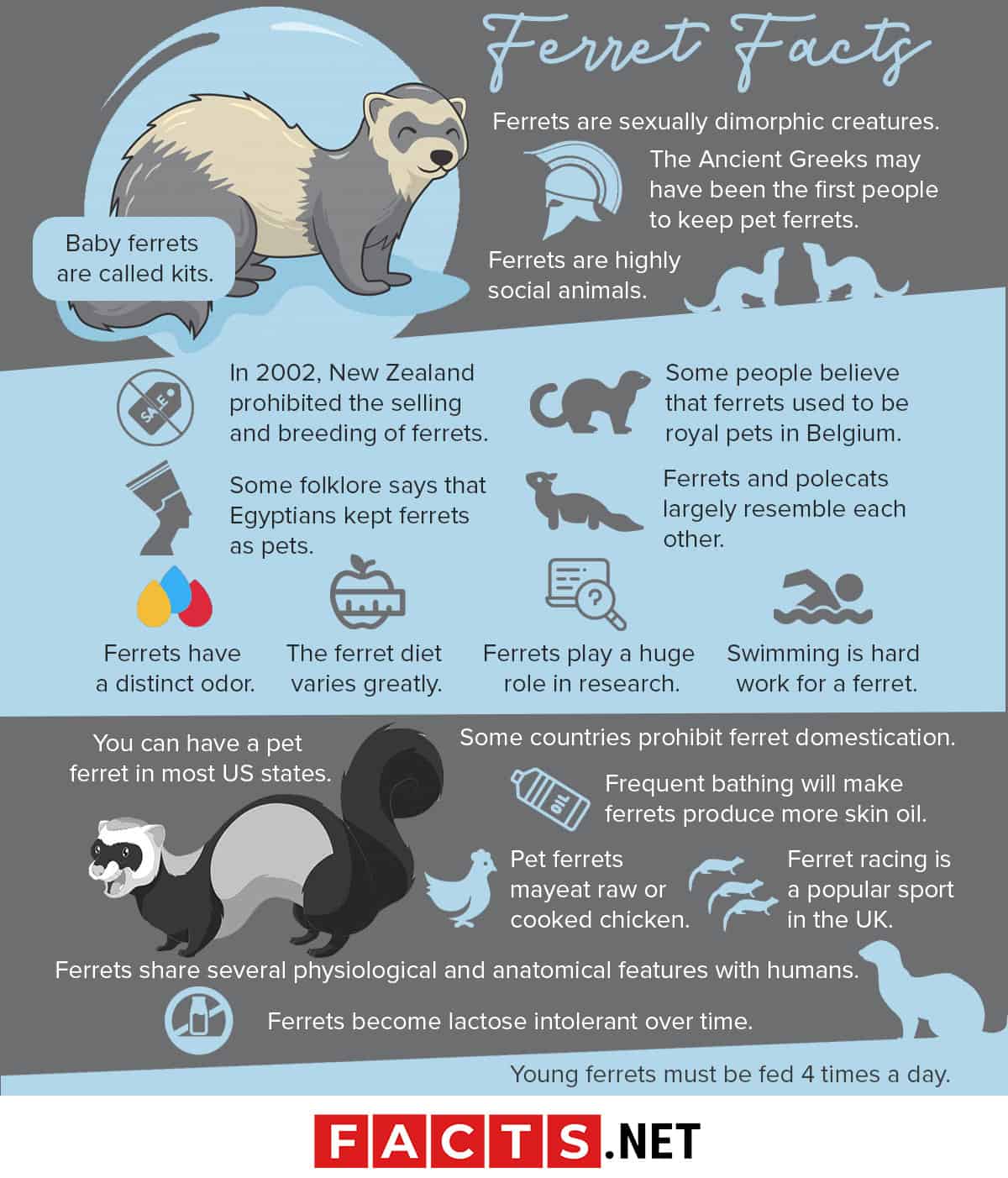
With their tube-like bodies, ferrets have captured the hearts of many as cute pets. As sociable animals, their perkiness often makes them a top choice for exotic pet owners. However, not many know about the responsibilities that come with owning a ferret. Learn everything you need to know about this animal with these ferret facts.
- A ferret’s lifespan lasts between 7 to 10 years.
- Ferrets come in 20 different types according to coloration.
- Ferrets weigh from 1.5 lbs to 4.4 lbs (0.7 to 2.0 kg).
- Normally, ferrets sleep around 15 to 16 hours per day.
- They’re more active at dawn or dusk.
- Mustela putorius furo is the ferret’s scientific name.
- This animal is a domesticated form of the European polecat.
- The European polecat is a species of ‘mustelid’ native to northern Morocco and western Eurasia.
- Mustelid is a family of carnivorous creatures such as wolverines, minks, martens, badgers, otters, weasels, and ferrets.
- Ferret are mammals.
- The ferret’s fur is typically black, white, brown, or mixed.
- The male ferret is notably much bigger than females.
- In contrast to the black-footed ferret, ferrets are not listed as an endangered animal.
- Ferrets are not nocturnal. They are crepuscular, or in other words, ferrets are more active at dawn and dusk.
- The name “ferret” came from the Latin word, ‘furittus,’ which means “little thief.”
- In some parts of the world, ferrets are used for rabbit hunting.
- The average ferret measures 25″ long from their nose to the tail.
- Ferrets’ ancestors were solitary animals.
- Ferrets are closely related to polecats that they can be hybridized.
- Countries like New Zealand experience an overpopulation of polecat–ferret hybrids in the wild.
Ferret Facts Infographics

In 2002, New Zealand prohibited the selling and breeding of ferrets.
Before the law passed in 2002, New Zealanders could regularly keep ferrets as pets. However, the government has since prohibited the distribution, sale, and breeding of ferrets. If you still want to keep a pet ferret, you’d have to secure a special permit that will allow you to keep ferrets for hunting rabbits.
Ferrets are sexually dimorphic creatures.
When an animal is sexually dimorphic, it means that males and females have distinct physiological features apart from their sex organs. Typically, male ferrets grow larger and heavier than females.
The Ancient Greeks may have been the first people to keep pet ferrets.
As cute as ferrets may be, they weren’t always treated as pets. According to Woodland Park Zoo, the ancient Greeks most likely tamed ferrets to hunt rats around 2,500 years ago. Eventually, people across Europe domesticated ferrets as pets beyond their practical uses.
Some folklore says that Egyptians kept ferrets as pets.
Although archaeologists haven’t recovered any ferret specimen from the ruins of Ancient Egypt, ferrets have been featured in Ancient Egyptian art and wall carvings. How’s that for cool ferret facts?
Ferrets and polecats largely resemble each other.
At first glance, ferrets and polecats look the same, but they have a few minor differences. More commonly, ferrets have a smaller head compared to polecats. In terms of their color, ferrets usually have a lighter coat than polecats. Ferrets also have a light patch of fur beneath their throat, which polecats lack. In terms of their built, ferrets have longer bodies, while polecats are leaner and more muscular.
Ferrets have a distinct odor.
Though ferrets have an odor, its smell depends on various factors such as a person’s sense of smell. In general, ferrets have a musky scent that comes from their skin. This musk makes their fur greasy as well.
Some people believe that ferrets used to be royal pets in Belgium.
While fossils of ferrets and rabbits have been recovered from the Laarne Castle in Belgium, no historical documents prove that the royals kept them as pets. As such, it’s highly likely that only the lower classes kept ferrets as pets in medieval times.
Ferrets are highly social animals.
Aside from their noodle-like appearance, many people keep ferrets for their endearing behavior. Usually playful and inquisitive, ferrets share similar characteristics with cats and dogs. You can even train them to use a litter box.
You can have a pet ferret in most US states.
While many states allow ferrets as pets, it’s still a good idea to have them vaccinated for rabies. Moreover, it’s also important to secure a vaccine against canine distemper, a virus which ferrets are vulnerable to.

Some countries prohibit ferret domestication.
State laws prohibit keeping ferrets as pets in California, New York, Washington DC, and Hawaii. Similarly, a few countries such as Puerto Rico, South Africa, and Portugal have totally banned ferret domestication. Meanwhile, some countries like Australia, Brazil, Japan, and New Zealand allow keeping them as pets under strict regulations.
That said, you wouldn’t have a problem keeping ferrets in the United Kingdom, Germany, Canada, Hungary, Peru, and Venezuela.
Frequent bathing will make ferrets produce more skin oil.
It’s recommended to bathe ferrets only once a month. Bathing them too frequently will strip away its skin oil, which can cause their skin to produce even more oil that can result in an unpleasant smell. Definitely one of the essential ferret facts to know about if you want to have one in the future.
The ferret diet varies greatly.
While they’re strictly carnivores, ferrets would eat any kind of meat. In the wild, ferrets are opportunistic feeders that would hunt and eat relatively small animals. For the black-footed ferret, its main prey is the prairie dog, consuming over 100 prairie dogs annually.
Pet ferrets may eat raw or cooked chicken.
If you want your pet ferret to have a nice meal, you can feed them cooked or raw chicken along with some kitten food. Typically, ferrets should have a high-protein diet. However, dry food helps keep their teeth clean. On the flip side, foods high in carbohydrates, dairy, or anything containing sugar are big no-no’s, since ferrets can’t naturally digest these substances.

Swimming is hard work for a ferret.
While some ferrets are natural swimmers, not all critters will enjoy a dip in the water. Ferrets may look like they’re gliding effortlessly in the water, but swimming is actually hard work for a ferret. As it swims, a ferret tucks its front paws beneath its chin, push its nose above water, and paddle with its hind feet, using its tail as a rudder. If you want to take your pet ferret for a swim, it’s advisable to keep a close eye on it the whole time. It’s also worth noting that chlorine can irritate a ferret’s eyes and skin.
Ferrets play a huge role in research.
Amidst the H1N1 outbreak in 2009, ferrets became a vital part of the experimental animal model for studying the virus. Aside from swine flu, ferrets have also helped advance research on human diseases like cardiovascular, respiratory, and gastrointestinal diseases.
Ferrets share several physiological and anatomical features with humans.
Since ferrets share many genetic aspects with humans, they are widely used as experimental subjects in biomedical research. As a result, ferrets have been studied for anatomy, neuroscience, reproductive physiology, virology, and endocrinology.
Ferret racing is a popular sport in the UK.
In the United Kingdom, ferret racing is usually featured in festivals and fairs or festivals. The racing events attract many audiences and large crowds where individuals may even place small bets on the ferrets. The track usually features various pipes and wire mesh. However, organizers primarily hold this event for entertainment purposes, unlike serious betting sports such as horse racing.
Baby ferrets are called kits.
The ferret’s pregnancy period lasts around 39 to 42 days. On average, ferrets can give birth to litters of 1 to 12 kits, who are born helpless with their eyes and ears sealed shut.
Ferrets become lactose intolerant over time.
Initially, kits only need milk as newborns. However, as soon as the grow up and have weaned from their mother’s milk, they become lactose intolerant. At this point, the ferret will start to transition into an adult diet.
Young ferrets must be fed 4 times a day.
As a pet, young ferrets can be fed with a combination of fresh meat along with low lactose milk and water. To help them grow, ferrets need to eat four times a day. For breakfast, lunch, and dinner, fresh meat will do. However, an extra serving of meat and low lactose milk per day goes a long way.
Ferrets are generally bigger than weasels.
Between the two, ferrets also have much shorter tails. In terms of their coat, weasels generally range from brown or reddish-brown tones with a white underbelly. Meanwhile, ferrets come in a wider spectrum of black, white, and brown colors.
Both weasels and ferrets have thick fur and short legs.
Despite their differences, both of them have thick fur, short legs, and anal scent glands which they use to signal potential mates and marking their territory.
Ferrets have sharper vision than cats at close range.
One of the coolest ferret facts is that they have a better close range vision than cats. However, ferrets have a blind spot; they cannot see things in front of their nose. To compensate, ferrets have a much sharper sense of smell compared to their limited eyesight.
Compared to humans, ferrets have more of a peripheral vision.
Unlike humans, ferrets’ eyes are located along the sides of their head. Due to this location, they rely more on peripheral vision. However, one of the cooler ferret facts is their ability to move their eyes without moving their heads, like humans.
Ferret eyes have only one solid color.
Though their eyes appear to be monotone, they also have a white sclera. However, an outer eyelid covers this white part which makes only the iris visible. Commonly, ferret eye colors come in shades of burgundy, dark brown, black, or red.
Albino ferrets are the results of inactive genes.
Once albinism occurs in a ferret, it inhibits color from their eyes, skin, and fur. As a result, albino ferrets are normally colored cream or white. Their eyes, which lack pigment, appear red or pink, since it’s essentially their blood. 
Source: Pixabay
Ferrets have eyebrows.
Part of ferrets’ expressive appeal comes from the whiskers above their eyes that look like eyebrows. These whiskers help ferrets sense things from above. How’s that for cute ferret facts?
Cancer is a common health problem for ferrets.
Ferrets are known to experience several distinct health problems, with the most common being cancer of the lymphatic system, adrenal glands, and pancreas.
Ferrets are one of the most popular companion pets in the U.S.
It is estimated that there are more than 5 million domesticated pet ferrets in the United States, making it one of the most popular companions in the country since the year 1988.
On average, a ferret would cost around $100 to $150.
If you’re wondering how much would it cost you to ow ferrets as pets, it widely varies with different locations, breeders, and pet stores. However, the general average price for ferrets ranges from $75 up to $300.
Was this page helpful?
Our commitment to delivering trustworthy and engaging content is at the heart of what we do. Each fact on our site is contributed by real users like you, bringing a wealth of diverse insights and information. To ensure the highest standards of accuracy and reliability, our dedicated editors meticulously review each submission. This process guarantees that the facts we share are not only fascinating but also credible. Trust in our commitment to quality and authenticity as you explore and learn with us.


